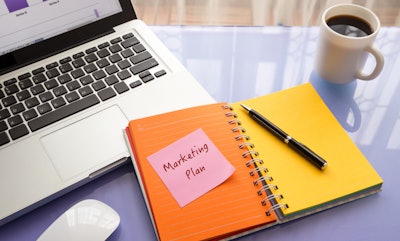
No, it's not March 2020 again—but we'll forgive you if you're feeling a bit of déjà vu with high-profile events like the Grammy Awards postponing to April and Sundance pivoting to virtual due to the latest COVID-19 variant. But it's important to remember that event professionals and marketers have two years' worth of lessons under their belts—not to mention, widespread vaccines and testing resources—to help guide them through the uncertainty.
But one major challenge is arising right now. How do you effectively market your event when it’s unclear how cases will look in the next few months? And if you do have to postpone or pivot, what's the best way to communicate that to attendees while minimizing the backlash?
Here are some top tips and best strategies for marketing your events throughout the Omicron variant—straight from the experts.
1. Always have a plan B when it comes to your marketing plan.
“Event planners always need to have a plan B so, yes, marketers should too,” says Channing Muller, principal of DCM Communications who specializes in marketing consulting and strategy for event professionals. “To most in the marketing/PR world, this means a crisis communication plan. Sometimes that crisis is a change in experience or a negative social media post. This year, there will be continued pandemic fatigue and event date/format changes.”
Muller says that flexibility is more important than ever right now. “The more you can be ready for that day, the faster you'll be able to get the message out there and control any potential damage that heightened emotion—i.e., disappointment, frustration, etc.—can cause.” She adds that it’s always better to have a plan B and not need it, noting that last-minute scrambling leads to rash decisions that may not be the best for your event or brand.
2. Choose your language carefully, and focus primarily on the content and value your event offers.
Muller advises marketing and event teams to be in constant communication right now, particularly when it’s difficult to know how the next few months will play out in terms of live gatherings.
“You want to be hopefully optimistic the in-person event can stay as it is, but you also don’t want to be advertising something that your event team knows they may not be able to deliver,” she explains. “This is where I would be uber careful with the language you use in your promotions. Focus on the value the event brings to the attendees that can be delivered virtually or in person. That way, if someone buys a ticket to attend one day and you change to virtual the next day (or a week later), they don’t feel as though it’s a bait and switch because your new format (or later date) will still provide the value they bought into—just in a different format.”
JR Sherman, CEO of event marketing and management platform RainFocus, agrees. He notes that if the content is right, the actual format shouldn’t matter as much—which he believes is something attendees have really come to understand over the last two years. “What really makes events as effective as they are has nothing to do with where or how they're delivered,” he explains. “It's that ecosystem of content, speakers, analysts, attendees and sponsors.”
Regardless of whether an event is held physically, virtually or a combination of the two, it’s all about getting back to the core—and building it in a way that can be flexible for last-minute changes, Sherman says. He cites the annual RainFocus Insights conference as an example, which the team recently decided to shift to a fully virtual program. The most important thing for him was minimizing the effect on attendees and maximizing the value they’ll find in the gathering. “They're going to have the same experience,” Sherman explains. “It's going to be familiar and consistent, whether they're coming to a physical event with us and registering and building their agendas, or whether they're attending virtually within our framework and our portal.”
3. Consider partnering with an event management platform that allows for easy pivots.
For Sherman, partnering with the right event management and technology partners is key right now, since it gives you the flexibility to switch back and forth easily without having to start from scratch with new vendors. He notes that RainFocus currently has a number of clients who have switched to virtual and haven’t experienced too many setbacks because their team was prepared for that from the beginning.
“Let's focus on putting a platform in place that gives you flexibility for unexpected circumstances and allows you to really focus on the right content for the right people,” he says. “I believe that with a platform in place for experience management, for managing all of your events and experiences and thinking of it in the martech stack, you really transcend that concept of virtual, physical or hybrid.”
4. Be transparent with safety protocols.
If you do decide to host an event in person right now, or are marketing one for the future, Muller says that outlining safety procedures is still crucial—though it probably doesn’t need to be front and center on every single piece of promotion. “Your registration website and email confirmations need to have detailed information about what you are doing to keep the guests safe,” she advises. “Maybe your target audience is feeling pandemic fatigue and just doesn't care anymore, particularly if they are vaxxed and boosted, but you, as the one organizing this, should 100% care if your event turns into a super spreader.”
Plus, Muller adds, “if you are trying to sell tickets, transparency in the protocols you are following will be more helpful than harmful. Not saying what you are doing will leave people questioning if you are doing anything, and as a result they could abandon the page before buying.”
Her top tip? Keep the messaging simple, with language like “COVID procedures will be followed. More info on our website.” “The goal of any promos is to first drive traffic to the registration/conversion page, and then to keep excitement built for registrants until the event is actually here,” Muller says. “So as long as the COVID measures are outlined on the conversion page, then having it on every single post isn’t really needed.”
5. Make a plan to deal with any backlash.
Of course, you could have the best marketing plan in the world and there will still be attendees who are upset about the decisions you make. Sherman notes that at this point in the pandemic, attendees do tend to be flexible and accustomed to the need for change—but it’s all about how you actually implement that change.
If you’re pivoting to digital, use your marketing materials to “focus on the plusses you can emphasize,” Sherman suggests. “Obviously the negatives are that we won't be able to get together and have the hugs and handshakes that we usually do. But in a virtual environment, we have so much more flexibility about what we can consume and when we can participate. And even if we miss something, to go back and consume it because it's been created and stored digitally.”
Another way to avoid backlash during an event format change? Minimize the work your attendees need to do to accommodate the change. “If you've made a good platform choice, and you're not just picking an event technology for the moment, attendees can have a consistent experience,” Sherman explains. If you use the same platform, for example, attendees can easily be switched from physical to virtual (or vice versa) without having to register again, create their agendas again, etc. “Any of those things really just add a layer or a barrier between the individual and what they're looking to get," he adds. "So our objective is to really short circuit that, and give individuals a familiar environment that they already know how to navigate."
Muller thinks the key to avoiding backlash is having a deep understanding of your target audience and what that group would want to see in place before they sign up or attend an event. “In general, marketing should always target the ideal attendee,” she advises. “Sure, there will be outliers who could come and still benefit from doing so, but your event team is designing an experience for the target attendees, not the outliers. So you need to market accordingly.”
6. Above all, be honest and transparent.
Transparency is everything right now. “If and when the time comes to change a format or date, you need to be 100% transparent as to why you are changing,” Muller says. “Yes people may be upset—but they will be even more upset if you try to spin it or gloss over, which can hurt you much more in the long run.”
And if your event is held in person and leads to positive COVID cases, Muller recommends getting in front of the news right away. Through contact tracing, find out if the cases are tied to a particular breakout session or ancillary event. “If it’s only the 8 a.m. yoga class that has a concentration of cases and the rest of your 500-person event doesn’t have any reported, then your communications should go out to the attendees of the yoga class first.”
But if contact tracing indicates that positive cases are more widespread, Muller recommends emailing all your internal team members first, to make sure everyone is on the same page in terms of messaging. “You need to be presenting a united front in case anyone else gets a call, email or message about it,” she notes. “Then you reach out to your vendors and sponsors, then to the attendees. The message here across the board should be focused on displaying your care for the safety of everyone who was in-person, and 100% transparency about what you found out, how many cases, when they were reported, how long ago they tested positive, etc.”
She adds, “The more you can convey up front, including how you are handling it and will attempt to further prevent it at the next event, the less number of questions, freakouts and backlash you’ll have to deal with later.”



















